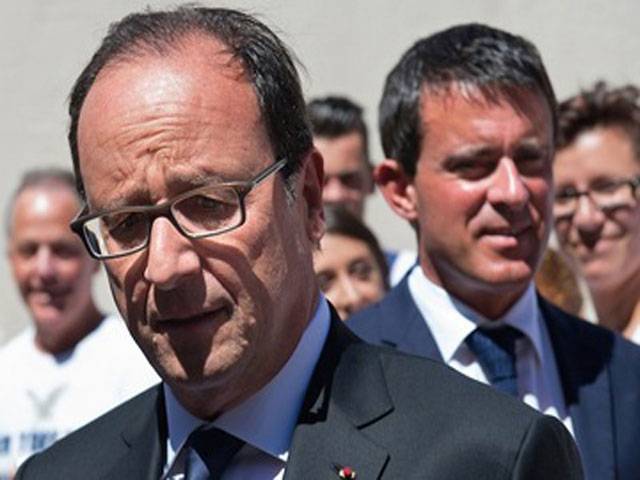PARIS : France was set to unveil a new cabinet Tuesday, after the shock resignation of the government amid a row over economic policy plunged the country into deep crisis.
Already battered by record unemployment and an economy at a standstill, the deeply unpopular President Francois Hollande is using the reshuffle to reassert his authority over his feuding Socialist Party. The crisis was sparked by a weekend of sniping by economy minister Arnaud Montebourg, a left-wing firebrand well known for outspoken views, over austerity policies implemented by Paris that he blamed for the worst crisis in Europe and France since the 1929 Great Depression. Hollande called Tuesday for a government “of clarity” that will toe the line, after Montebourg took two other left-wing rebels, culture minister Aurelie Filippetti and education minister Benoit Hamon, with him.
Leading daily Le Monde said: “The political return from holiday was already looking difficult for the president and the prime minister. In a few hours, it became explosive.”
It described the cabinet reshuffle, expected to be unveiled later on Tuesday, as “the last chance for the president to save his five-year term.”
Hollande and Prime Minister Manuel Valls were putting the finishing touches to the reshuffle over lunch and the new government was expected to be announced later in the afternoon on Tuesday.
“It will not be a big reshuffle,” said government spokesman Stephane Le Foll.
Sources at Hollande’s Elysee Palace office told AFP that he had decided on a complete reshuffle rather than dismissing the rebels in a bid to “ensure that the new government is completely and consistently on the direction fixed by the head of state.”
Hollande stressed in an interview with Le Monde last week that France should go “faster and further” with economic reforms he hopes will pull the country out of the morass.
He is pinning his hopes on the Responsibility Pact, a 40-billion-euro package of reductions in social charges for businesses in return for a pledge to create 500,000 jobs by 2017.
With France’s public debt under scrutiny from the European Union, Hollande intends to finance this with 50 billion euros of cuts in public spending, drawing the ire of leftists like Montebourg, who took a parting shot at austerity measures in a final statement.
“For two years, I fought tirelessly to convince, I wrote notes and letters to the head of the executive and made private and public declarations to attempt to convince and implore the president to refuse excessive measures for our country that risked damaging and sinking our economy,” he said.
He dismissed austerity measures as a “financial absurdity” and said they were driving voters “into the arms of extremist parties” - an allusion to the rise of France’s far-right National Front.
In an earlier interview with Le Monde, he took a swipe at European powerhouse Germany, which has been at the forefront of efforts to bring down ballooning public deficits that sparked the eurozone crisis.
Warning that France would no longer “be pushed around” by its neighbour and ally, he said: “You have to raise your voice. Germany is trapped in an austerity policy that it imposed across Europe.”
Montebourg insisted that he was leaving on “amicable terms” with the prime minister but the ejection of the three left-wing ministers from the cabinet raised fears of a wider split within Hollande’s Socialist Party that could threaten his parliamentary majority.
The prime minister himself, seen as closer to the right flank of the Socialist Party, is also deeply unpopular with many on the left of French politics.
Two Green ministers left the government when Valls was appointed in March after the Socialists suffered a drubbing at local elections.
Opposition figures said there was a major crisis of confidence at the heart of the executive, with far-right leader Marine Le Pen even calling for the lower house National Assembly to be dissolved.
Noting that Hollande was “more and more isolated,” left-wing daily Liberation said France was suffering a “regime crisis” but the main opposition centre-right UMP party has been careful not to call for a dissolution of parliament.
A recent survey by polling institute IFOP showed that more than eight in 10 French people had no confidence in the government when it came to economic growth, reducing the deficit or fighting unemployment.
Friday, April 19, 2024
France awaits new govt after shock resignation

Caption: France awaits new govt after shock resignation
8:27 AM | April 19, 2024
8:09 AM | April 19, 2024
Opposition objects to oath-taking of MNAs amid lawlessness
5:15 PM | April 19, 2024
Electioneering to end on Friday night ahead of by-polls in 21 constituencies
5:14 PM | April 19, 2024
Fawad Chaudhry granted bail in 14 cases related to May 9 violence
5:13 PM | April 19, 2024
British Army chief lauds Pakistan Army's professionalism, expertise
5:12 PM | April 19, 2024
Israeli aircraft fire missiles at Air Force assets in Iran: Report
3:52 PM | April 19, 2024
A Tense Neighbourhood
April 19, 2024
Dubai Underwater
April 19, 2024
X Debate Continues
April 19, 2024
Hepatitis Challenge
April 18, 2024
IMF Predictions
April 18, 2024
Kite tragedy
April 19, 2024
Discipline dilemma
April 19, 2024
Urgent plea
April 19, 2024
Justice denied
April 18, 2024
AI dilemmas unveiled
April 18, 2024
ePaper - Nawaiwaqt
Advertisement
Nawaiwaqt Group | Copyright © 2024





